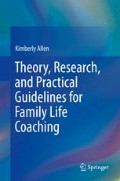Abstract
Chapter 10 focuses on the application of parent coaching. Knowing parenting techniques is only part of what a family life coach needs to know to be effective at parent coaching. There are several theoretical foundations for parent coaching, and while the Adlerian parenting approach is the primary focus of this chapter, child development theories, parenting theories, and emotion coaching are also covered.
Furthermore, family life coaches must know how to translate knowledge about child development and parent child interactions in a way that is consistent with the coaching process. There is a delicate balance between the coaching process and relaying education, therefor a case study that highlights the importance of having both coaching skills and content knowledge for working with a family on a parenting issue is presented. Chapter 10 provides strategies and practices for how to translate knowledge about parent child interactions in a way that is consistent with coaching.
Access this chapter
Tax calculation will be finalised at checkout
Purchases are for personal use only
Further Reading
Dinkmeyer, D., McKay, G., & Dinkmeyer, D. (1997). The parent’s handbook: Systematic Training for Effective Parenting. Circle Pines, MN: American Guidance Service.
Dreikurs, R. (1958). The challenge of parenthood. New York: Hawthorne Press.
Gottman, J. (1998). Raising an emotional intelligent child: The heart of positive parenting. New York: Simon & Shuster.
Nelson, J. N. (2006). Positive discipline. New York: Random House.
References
Adler, A. (1956). The individual psychology of Alfred Adler: A systematic presentation in selections from his writings. New York: Basic Books.
Ainsworth, M. D. S., & Bowlby, J. (1991). An ethological approach to personality development. American Psychologist, 46, 33–341.
Allen, K., & Baker, T. (2016). Family life coaching: A grounded theory. Manuscript in preparation.
Allen, K., El-Beshti, R., & Guin, A. (2014). An Adlerian integrative approach to creating a teen parenting program. Journal of Individual Psychology, 70(1), 7–20.
Allen, K., & Huff, N. (2014). Family coaching: An emerging family science field. Family Relations, 63(5), 569–582. doi:10.1111/fare.12087.
Allen, K., Jolly, C., Guin, A., & Roper, R. (2015). Very important parents curriculum workbook: 82 individual activities for parents. Raleigh, NC: North Carolina State University.
Baker, T. (2014). Family coaching: An exploratory study of parental perceptions. Master’s thesis. Retrieved from: http://repository.lib.ncsu.edu/ir/handle/1840.16/1/simple-search?query=family+coaching
Bandura, A. (1977). Social learning theory. Englewood Cliffs, NJ: Prentice-Hall.
Barber, B. K., Stolz, H. E., & Olsen, J. A. (2005). Parental support, psychological control, and behavioral control: Assessing relevance across time, method, and culture. Monographs of the Society for Research in Child Development, 70(4), 1–147.
Baumrind, D. (1966). Effects of authoritative parental control on child behavior. Child Development, 37(4), 887–907.
Baumrind, D. (1997). Necessary distinctions. Psychological Inquiry, 8, 176–182.
Bettner, B. L., & Lew, L. (1989). Raising kids who can. Newton Centre, MA: Connexions Press.
Bowlby, J. (1988). A secure base. New York: Basic Books.
Bronfenbrenner, U. (1979). The ecology of human development. Cambridge, MA: Harvard University Press.
Carmack, C., & Carmack, E. (1994). Children the change: The challenge of parent education in the new Russian Federation. Journal of Individual Psychology, 50(3), 322–328.
Croake, J. W. (1983). Adlerian parent education. The Counseling Psychologist, 11(3), 65–71.
Dinkmeyer, D., McKay, G., & Dinkmeyer, D. (1997). The parent’s handbook: Systematic Training for effective parenting. Circle Pines, MN: American Guidance Service.
Doherty, W. J. (1995). Boundaries between parent and family education and family therapy. Family Relations, 44, 353–358.
Dreikurs, R. (1958). The challenge of parenthood. New York: Hawthorne Press.
Dreikurs, R., & Soltz, V. (1964). Children: The challenge. New York: Hawthorne Books.
Duncan, S. F., & Goddard, H. W. (2011). Family life education principles and practices for effective outreach. Los Angeles: Sage.
Gilligan, C. (1982). In a different voice. Cambridge, MA: Harvard University Press.
Gockel, A., Russell, M., & Harris, B. (2008). Recreating family: Parents identify worker-client relationships as paramount in family preservation programs. Child Welfare Journal, 87(6), 91–113.
Gottman, J. (1998). Raising an emotional intelligent child: The heart of positive parenting. New York: Simon & Shuster.
Kohlberg, L. (1981). Essays on moral development (Vol. 1). New York: Harper & Row.
Layton Blain, K. (2010). The go-to mom’s parent’s guide to emotion coaching young children. San Francisco: Jossey-Bass.
McCready, A. (2006). Positive parenting solutions. Retrieved from http://www.positiveparentingsolutions.com
Myers-Walls, J. A., Ballard, S. M., Darling, C. A., & Myers-Bowman, K. S. (2011). Reconceptualizing the domain and boundaries of family life education. Family Relations, 60(4), 357–372. doi:10.1111/j.1741-3729.2011.00659.x.
Nelson, J. N. (2006). Positive discipline. New York: Random House.
Piaget, J. (1936). The origins of intelligence in children. New York: International Universities Press.
Popkin, M. (1993). Active parenting today. Marietta, GA: Active Parenting.
Author information
Authors and Affiliations
Rights and permissions
Copyright information
© 2016 Springer International Publishing Switzerland
About this chapter
Cite this chapter
Allen, K. (2016). Parent Coaching. In: Theory, Research, and Practical Guidelines for Family Life Coaching. Springer, Cham. https://doi.org/10.1007/978-3-319-29331-8_10
Download citation
DOI: https://doi.org/10.1007/978-3-319-29331-8_10
Published:
Publisher Name: Springer, Cham
Print ISBN: 978-3-319-29329-5
Online ISBN: 978-3-319-29331-8
eBook Packages: Behavioral Science and PsychologyBehavioral Science and Psychology (R0)

